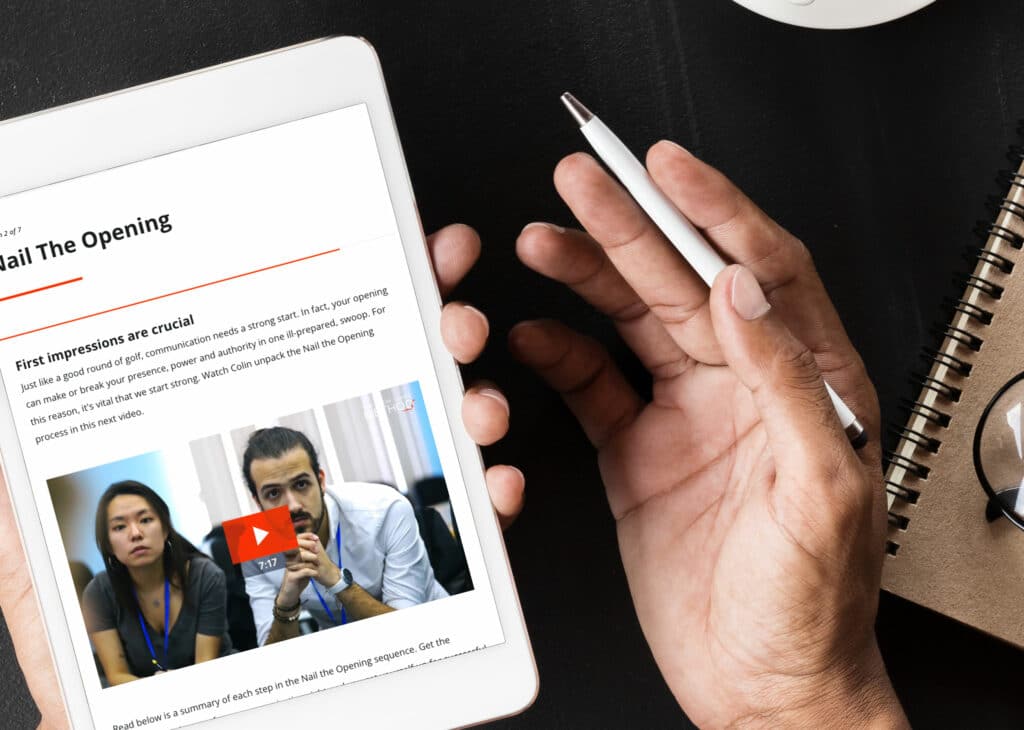Half of all employees will need reskilling by 2025, says the World Economic Forum (WEF).
Communication skills courses have never been more valuable, as the demand to upskill employees increases dramatically.
As a result of the double-disruption of the economic impact of the pandemic, along with increasing automation and digitisation, the WEF’s “Future of Jobs” Report lists the top 10 work skills as:
- Analytical thinking and innovation
- Active learning and learning strategies
- Complex problem-solving
- Critical thinking and analysis
- Creativity, originality and initiative
- Leadership and social influence
- Technology use, monitoring and control
- Technology design and programming
- Resilience, stress tolerance and flexibility
- Reasoning, problem-solving and ideation
Every single one of these skills, bar none, requires strong and influential communication in order to be effective. After all, how can you possess leadership and social influence without the ability to inspire, motivate and lead your team using first-class communication? How do you expect to be effective in technology design and programming without active listening skills and the ability to communicate and collaborate in a team?
From critical thinking to resilience, technology monitoring to ideation, the skills you will need in 2025 are underpinned by excellent communication.
Are your skills up to scratch? Are your teams? Now is the time to invest in personal development to ensure you keep up with those around you.
What is communication skills training?
Communication skills training covers all the essential soft skills and techniques required to communicate effectively in the workplace. This includes the art of persuasion, delegation, negotiation, presentation skills and effective team leadership. In every project meeting no matter your seniority someone will be trying to persuade attendees to get onboard with their idea. It’s happening all day around us at work and at home!
Good communication skills training will cover more than just verbal communication; it covers physiology, presence, personal brand and mindset.
Traditionally there are said to be four types of workplace communication: verbal, body, phone and written. However, in today’s world of Zoom and Microsoft Teams, we can add a fifth type of communication to that list: virtual. Have you been as effective behind a screen as in person? It’s a new skill nearly everyone had to master in 2020 due to COVID. Some were more successful than others!
Why is it important to learn communication skills as a professional?
Effective communication skills are not just for those in a sales role who speak to customers all day and need to persuade. Team meetings, project reviews, 1:1 performance appraisals, job interviews, change management presentations and incidental meetings with senior leaders in the lift all require you to have your A game.
Influencing others in those key moments – and getting cut-through – is how you will stand out in your organisation. Hopefully leading to you being scouting for another role or tapped on the shoulder to move up the ladder faster than your peers. Every conversation is the opportunity to impress.
We get a broad range of corporate professionals, entrepreneurs, speakers, senior executives and facilitators investing in the online communication skills training we offer as the content and its application is relevant to all of them and we have a deep focus on ensuring long-term results. As previous attendee Tony Maroun a Broker Manager from ANZ said “The content and facilitation was extremely informative and there was genuine interest in ensuring we were learning”.
If COVID19 has taught organisations anything, it’s the need for agility and a flexible workforce. Today’s professionals across the globe are working all sorts of hours, are away from the office, and need space and fluidity for development and growth. And since communication is now multi-channel, so too must be the delivery of communication skills courses.
Sales professionals must convey trust and professionalism through a screen. Project leads need to get buy-in from multiple stakeholders. Leaders must engage and inspire from afar. CEOs must adapt and lead with total confidence.
Gideon Kline, as the CEO of True North Partners, found that he had a lot to learn from the Mastering Communication skills training we offer. “Stimulating insights with loads of time to practise, observe and learn how to improve. Would highly recommend it to any professional with any level of pre-existing ‘perceived’ skill.”
Real work scenarios in which a communication skills course can help
1. An important business opportunity is coming up and you want to know how to prepare effectively and be impactful
You could be in sales, operations or business development, but when that once-in-a-blue-moon opportunity comes up, you need to have total confidence that your workplace communication skills will ensure you get the desired outcome. Today’s organisations can’t afford to lose business and employees that are able to secure big wins are proving themselves invaluable.
2. You’re asked to prepare a presentation at the last minute and need a reliable framework to design and deliver it well
Last minute presentations are nobody’s idea of fun. Even the greatest of presenters will tell you, they appear to be polished because they’re so well practised. That said, in a fast-paced, flexible working world, sometimes spontaneous presentations are unavoidable.
It’s in these moments you’ll be glad to have a solid framework, our online communication skills training provides several downloadable templates that guide you step-by-step through a presentation ensuring your opening grabs attention; your content designed to be memorable; you’ve tailored to the audiences needs; and your delivery keeps them glued. Ensuring a successful conceptualisation and delivery – even when you’ve only minutes to prepare.
3. You’re new to a role or going through a business restructure and need to make a positive impact, fast
There are times when we need to make an impression and fast. When a business is undergoing major change, experiencing a crisis situation, or you’re simply new to your role, it’s essential to stand out and have an impact, whether you’re CEO or still working your way up.
4. You’re a subject matter expert who lacks the skills to translate their genius into layman terms for the masses
You might be an analytical genius but unless you have some sort of interpreter converting your analysis and strategic input into actionable business outcomes, you’re not going to get your message across. You need to have the communication ability to match your other enviable skills.
If you’re in doubt that you skills matchup or that you can perform in these key moments with limited time to prepare… it might be worthwhile investing in our online training. It’s 24/7 access to 30+ training videos from communication expert and Australian Speaker of the Year Colin James.
Colin becomes your personal coach with a training video or worksheet ready to support you when you’re in need. It’s a self-paced course with 12-months access, jump in and start learning today to upskill your communication and secure your ambitious future.
The Colin James Method® Facilitators train corporate executives to improve their professional communication skills with a proven methodology. Our highly trained Facilitators and Coaches are recognised for their experience in their fields and have worked with many individuals and organisations around the world to master the art of communication.
FAQ
How do I communicate better?
There are plenty of communication tips and techniques to be found in The Colin James Method® blog, but if you want to ensure you’re at the head of the pack, sign up for a communication skills course. We offer a range of online, virtual and corporate communications training.
What are the 3 types of communication skills?
The three types of communication are said to be verbal, nonverbal and visual. However, people also talk about the four types of workplace communication, which are verbal, body, phone and written.
What jobs require good communication skills?
Every job requires good communication skills to some degree. Customer-facing roles will definitely require solid communication ability but, in fact, anybody in a position where they’re working with others will need good communication skills – particularly if they want to stand out. For this reason, a communication skills course is probably the best career investment you can make.












